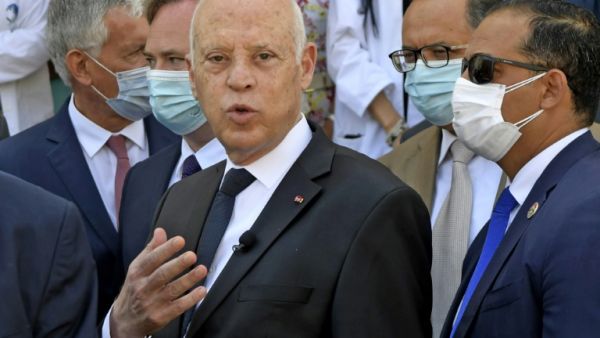Tunis is in crisis – it is a crisis across the board that started by economic turmoil and descended into political havoc that resulted in the sacking by president Kais Saied of Prime Minister Hichem Mechichi, freezing Parliament, stripping MPs of their immunity and taking the reins of executive authority while placing himself as the executive ruler of Tunisia.
Many, inside and outside the country, are stunned by his move regardless of its justifications. Is it a power grab, a ‘coup’ as the Islamists and their allies are calling it or just a cry in the wilderness to try and put things right?
President Saied said this is not a ‘coup’ but took this measure – perfectly within his rights under Article 80 of the constitution as he claims – to save the country after continual nationwide demonstrations against the economic crisis the country has been reeling under and the inability of the political authority – parliament and government to function in a coordinated manner.
[Thread] 1/ This is a thread on Twitter manipulation around #Tunisia, where the current President is accused of instigating a coup. One Arabic trend translates as "Tunisians revolt against the Brotherhood". I analysed around 12000 tweets from 6800 unique accounts #disinformation pic.twitter.com/BXEEL9R3rL
— Marc Owen Jones (@marcowenjones) July 26, 2021
It is well-known the president has long been at loggerheads with the prime minister and parliament over policy. But the power grab, if we can call it that for want of a better phrase, and/or regardless of how temporary it is going to be is alarming many. It has set alarm bells ringing about a possible return to the dark autocratic era of Zine el Abidine Ben Ali who ruled Tunisia through tooth and nail for 30 years.
What is of major worry is that President Saied quickly took his constitutional claimed prerogatives, which are also questioned by many inside the country and quickly appointed himself as the new executive authority while allying himself with the army and military officers who quickly set about to enforce his orders: To make sure parliament remains closed under lock and key for the time being – and at least 30 days.
Tunisia's democracy is at risk.The US position must be clear: Tunisia's Parliament must be allowed to resume its duties immediately. All actors must follow the Tunisian Constitution and work to preserve the democracy so many sacrificed so much to achieve.https://t.co/fePazyq7rp
— Rashida Tlaib (@RashidaTlaib) July 26, 2021
After the order, the speaker of Parliament Rached Ghannouchi, head of the Islamic Ennhada tried to enter the building and hold a parliamentary session as if everything is normal, but he was stopped by the army. As head of the largest Islamist party, he, together, with his allies and supporters made a sit-in outside Parliament but this was to no avail, for it was reported later that Ghannouchi’s had been placed under house arrest but this was quickly denied by his party.
What is happening in Tunisia is fiction from a political dairy. The specter of a civil war looms over the country, and this would be disastrous for the whole country after years of trying to put it together. One would have expected that the actions taken by Saied to be denounced by the rest of Tunisians but this is the case. For many people supported the president’s actions in freezing parliament and dismissing its Prime Minister who is considered an ally of Ghannouchi. But in all fairness Mechichi accepted his dismissal gracefully and said he would accept whatever decisions made by the president.
The suspension of Tunisia's Parliament and the dismissal of the Prime Minister of Tunisia on Sunday by its President are of great concern. pic.twitter.com/Z9RyCGv2f8
— Anwar Ibrahim (@anwaribrahim) July 27, 2021
Nevertheless, the drastic actions quickly taken by the president were because of a nationwide protest movement that erupted in such towns as Nabeul, Sousse, Kairouan, Sfax, Tozeur, Gafsa and Sidi Bouzid against the Islamists and the government days before the freezing of parliament with police using teargas to disperse the crowds. In one reported case, an Ennhada office was ransacked with computers damaged and files thrown on the streets.
By the same token however, the supporters of Ghannouchi took to the streets where there was clashes with anti-Islamist protestors that took place and arrests made outside the parliament building. In a way this was different than the Arab Spring protest of late 2010 and early 2011 where the Tunisian street showed unity. What is happening today on the other hand shows marked division and schism.
Proud of you, Mr. President. Thank you very much♥️
— madyouni sirine (@MadyouniSirine) July 26, 2021
Long live a free and independent Tunisia????????#تونس_تنتفض_ضد_الاخوان #تونس
#قيس_سعيد pic.twitter.com/3Cj1D25pBz
It is this ‘boiling situation’ the president needs now to contain and lower the protest tempo. With his political dismissals – for with the Prime Minister he sacked the Defence Minister Ibrahim Bartaji and Hasna Ben Slimane, the acting justice minister as well as other top officials – he may be sending the wrong signals for he says he wants to appoint a new prime minister he can work with to solve the current political crisis. But such an appointment should be made through parliament which he already froze. Thus there is an obvious political quagmire he needs to get out of.
Also, the president’s high-handedness is worrying many, both inside and outside the country like the US Secretary of State Antony Blinken who has already expressed concern about the course of the democratic process which has been built after the Tunisian Jasmine Revolution of 2011 and which has been seen as the most successful model in the region emanating from the Arab Spring protests.
Tunisia’s president said he was firing the prime minister, suspending Parliament and taking control of the nation after large anti-government protests. The power grab was seen as a major threat to the only democracy to emerge from the Arab Spring protests. https://t.co/ncRTvZa1mO pic.twitter.com/wSIq7fZdDg
— The New York Times (@nytimes) July 26, 2021
What is clear however, no amount of political change would be enough if it doesn’t change the daily economic life of the Tunisian man-in-the-street who is looking for better living standard characterized by jobs. At present the rate of unemployment stands at 17 percent and joblessness is particularly high among the youth and women. The authorities should learn to address this situation because of the young cart-seller, Mohammad Bouazizi, who set himself alight and started the first Tunisian Arab Spring Revolution in late December 2010.
However, despite the political openness, the multi-parties and elections the lot of the Tunisian is still the same. The country has continued to suffer from economic crises, with a fiscal crunch and high debt, declining state services, corruption and general paralysis in the state and economy. These have gotten worse during the Coronavirus pandemic that started in 2020 and have continued into 2021 with the country’s healthcare system near-total collapse as the country continues to fight another surge of the deadly virus infections.
And with an economy shrinking at 8.8 percent in 2020, the government had to ask for outside help especially in the field of medical aid from Egypt, Libya, Saudi Arabia and the United Arab Emirates to help it fight Covid-19 and which is sending people back on the streets again.
This is a new low, even for DC pundits: withhold vaccines to Tunisia as leverage. pic.twitter.com/wOKD1IiWhM
— Fadil Aliriza (@FadilAliriza) July 27, 2021
Thus situation remains fluid and precarious. Despite the deep political problems President Saied has opened up a Pandora’s box of more potential conflict and stability. We need to see and wait what will happen in the next days and weeks and how will he handle the situation he has put himself into. Will he establish himself as the ruler par excellence or get back to democratic practice.







